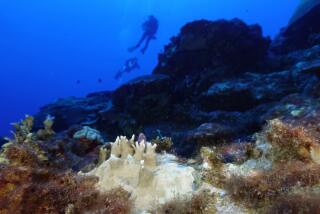ENVIRONMENT / MEDITERRANEAN IN DISTRESS : Pollution and Deep Blue Sea
PALMA DE MAJORCA, Spain — A terrible loss of animal life etched the issues for all to see on the eve of an international conference on the environment of the Mediterranean Sea: Scores of dead dolphins were washing up on the beaches of Majorca, the Costa Brava and other favorite resorts of Spain.
Veterinarians concluded that contamination of the Mediterranean had broken down the immune systems of these sleek animals, leaving them too weak to fight off a viral infection.
It was a dramatic reminder that the calm and light-blue waters of the Mediterranean have become polluted in the last few decades by the immense industrialization of southern Europe and by the 50 million tourists who crowd onto the sun-drenched beaches every year.
The Rhone River alone, which courses past some of France’s most potent petrochemicaland nuclear energy plants, each day deposits an enormous tonnage of nitrates, sulfates, iron, sewage, mercury and pesticides into the sea.
The issues thus seemed obvious enough when the Conference on Security and Cooperation in Europe (CSCE) opened its meeting on the Mediterranean environment here almost a month ago.
But the Mediterranean, usually described as the cradle of European civilization, has often been a crucible of conflict as well. So, it was not too surprising that the meeting of 35 nations, which ended with flowery and general promises of cooperation Friday, was caught up in tense wrangling during key moments of negotiation.
A political problem erupted on the first day when Spanish Foreign Affairs Minister Francisco Fernandez Ordonez, supported by the Italian foreign minister, called on the member governments “to apply the spirit of Helsinki to the Mediterranean and Middle East” and create a new organization, the Conference on Security and Cooperation in the Mediterranean.
The proposal touched the heart of the history of the organization. The CSCE, a meeting ground for Europe’s Western and Communist camps, first met in Helsinki in 1973 and produced a series of agreements on human rights two years later that became known as the Helsinki Accords. Since the Soviet Union had signed the accords, dissidents in Eastern Europe embraced them as justification for their cries for freedom.
With the world in crisis over Iraqi aggression in the Middle East, Fernandez Ordonez said, it is time to create an organization that would provide a meeting ground for all Mediterranean peoples, no matter how much in conflict. Steps might somehow be taken, for example, to ease relations between Israelis and Arabs just as the Helsinki Accords gradually led to an easing of U.S.-Soviet relations.
The Spanish-Italian proposal hit some delegations like a wet fish. Ambassador John Davis, the U.S. delegate, insisted it simply was out of place: It had nothing to do with the Mediterranean environment.
The U.S. government obviously looked on the proposal as a Pandora’s Box, one that might create a new forum for President Saddam Hussein of Iraq or lead to the kind of international conference on the Middle East that the United States has long opposed. In the end, the U.S. view prevailed: The final communique merely noted that the proposal had been made.
The conference also had the usual tug of wills between environmentalists and protectors of economic interests. In the end, according to the private environmental organization Greenpeace, the economic interests won.
Xavier Pastor, a Spaniard in charge of Greenpeace’s Mediterranean studies, denounced what he called the incompetence of many delegations and singled out the United States, the Soviet Union, Britain and the European Common Market secretariat as the main diluters of tough resolutions.
Britain, according to Pastor, had rejected a proposal by Italy to ban the mile-long drift nets that catch every small species in the way while trapping commercial fish in the Mediterranean.
Pastor pronounced the conference “a complete failure.” In the end, he said, the delegates failed to adopt any resolution that “will make a substantial difference in what is going on in the Mediterranean.”
More to Read
Sign up for Essential California
The most important California stories and recommendations in your inbox every morning.
You may occasionally receive promotional content from the Los Angeles Times.










